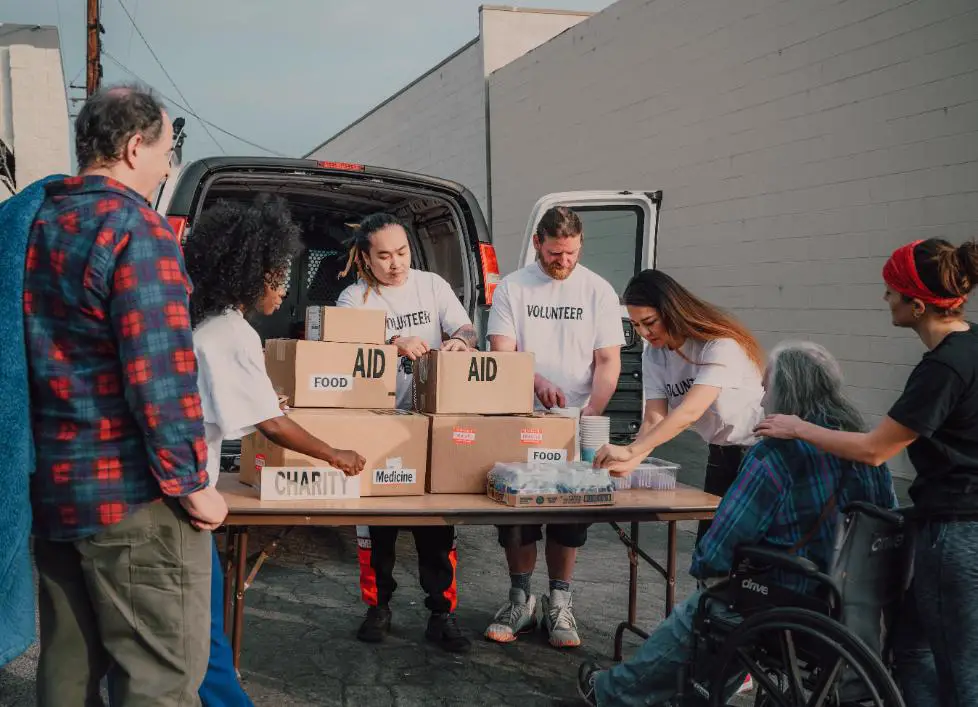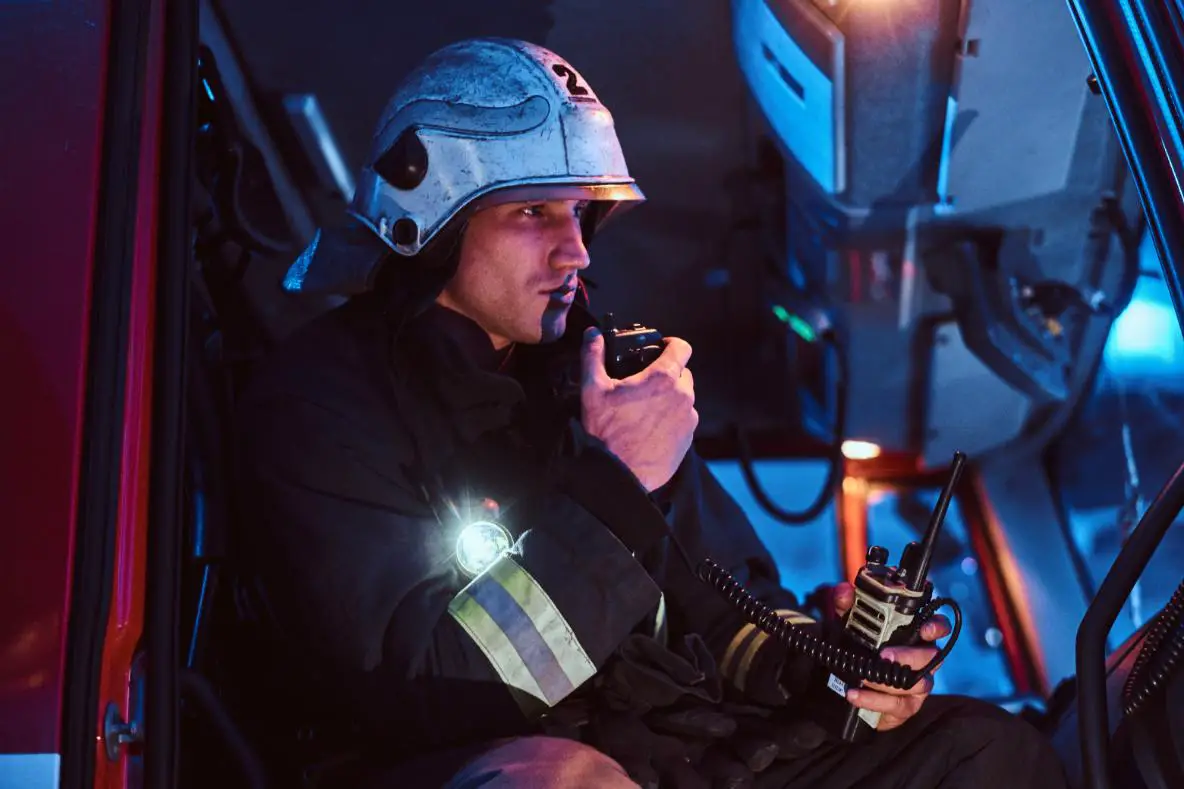In every neighborhood, there are everyday heroes—volunteer firefighters—dedicated to community safety.
It’s not just about fires and rescues; being a volunteer firefighter is a journey filled with meaningful experiences and perks.
From building community bonds to learning essential skills, each part of this journey adds up to personal growth and a positive influence on local areas.
Join us as we explore the special benefits that make being a volunteer firefighter more than just part-time work—it’s a fulfilling adventure of service, skill-building, and making a difference in the community.
Top 5 benefits of being a volunteer firefighter:
- Training and Skill Development
- Flexibility
- Skill Transferability
- Networking Opportunities
- Real-Life Impact

Benefit 1: Community Service
Volunteer firefighters actively participate in community service by responding to emergencies, fires, and disasters. Their commitment involves protecting lives, property, and the environment within their local community.
Through their selfless actions, they serve as a vital force in maintaining public safety and contributing to the overall welfare of community members.
Being dedicated to helping the community is a crucial part of being a volunteer firefighter. It shows a selfless and civic-minded attitude.

Benefit 2: Personal Fulfillment
Volunteer firefighters feel fulfilled because they know their contributions make a big difference. By dedicating their time and skills to the safety of their community, they find a sense of purpose that reflects personal achievements.
The emotional reward comes from knowing that their efforts directly enhance the well-being of others, creating a fulfilling connection to the community they serve.
This intrinsic satisfaction forms a powerful motivator, driving volunteer firefighters to continuously give their best in the face of challenges and emergencies.
Benefit 3: Training and Skill Development
Volunteer firefighters undergo rigorous training that extends far beyond basic firefighting techniques. This comprehensive training encompasses a diverse range of skills, including emergency medical services, rescue operations, and incident management.
The structured training programs ensure that volunteers are well-equipped to handle a variety of emergency scenarios with competence and confidence.
The continuous development of their skills not only enhances their effectiveness during emergencies but also prepares them for leadership roles within the firefighting community.
Benefit 4: Team Camaraderie
A cornerstone of the volunteer firefighting experience is the strong sense of team camaraderie that develops within the firefighting unit.
Volunteers develop close bonds with their teammates through shared experiences and the mutual reliance inherent in emergency response situations.
This creates a supportive environment where individuals trust and depend on each other, fostering effective teamwork during the high-pressure moments of firefighting and rescue operations.
The unity within the team not only enhances operational efficiency but also contributes to a positive and motivating atmosphere, making the volunteer firefighting experience both impactful and socially rewarding.

Benefit 5: Flexibility
One distinctive aspect of volunteer firefighting is the flexibility it offers in scheduling. Volunteers can balance their commitment to community service with other responsibilities, such as full-time employment or personal pursuits.
This adaptability ensures that a diverse range of individuals can contribute their time and skills to the firefighting team.
The ability to accommodate various schedules makes volunteer firefighting an inclusive opportunity for those who are passionate about community service but may have other commitments in their lives.
Benefit 6: Community Recognition
Volunteer firefighters receive recognition and appreciation from the communities they serve. This acknowledgment is a testament to their selfless dedication and the positive impact they make on the safety and well-being of residents.
Community recognition not only boosts the morale of volunteer firefighters but also strengthens the bond between the firefighting team and the residents they protect.
This mutual respect creates a supportive relationship, fostering a sense of pride and belonging within the firefighting community while reinforcing the importance of their role in the eyes of the public.
Benefit 7: Equipment and Uniforms
Volunteer firefighters are provided with essential equipment and uniforms by the fire department. This support ensures that volunteers are adequately equipped to respond effectively to emergencies, including fires, accidents, and other incidents.
The provision of equipment and uniforms not only enhances the safety and preparedness of volunteer firefighters but also alleviates personal financial burdens associated with acquiring the necessary gear.
This support reflects the commitment of the fire department to ensure that volunteers have the tools and attire needed to perform their duties safely and efficiently.
Benefit 8: Networking Opportunities
Volunteering as a firefighter opens doors to valuable networking opportunities within the community and the broader emergency services sector.
Building connections with fellow volunteers, community members, and professionals creates a network that extends beyond the fire station. These connections can lead to collaborative initiatives, shared resources, and a deeper engagement with the community.
Networking opportunities contribute to the professional development of volunteer firefighters, fostering relationships that go beyond emergency response and play a vital role in building a supportive and interconnected firefighting community.
Benefit 9: Diverse Experiences
Volunteer firefighters encounter a diverse array of experiences that contribute to personal growth and skill development. From responding to fires and medical emergencies to participating in community events and outreach programs, volunteers navigate a dynamic range of situations.
This diversity not only keeps the role engaging but also increases their adaptability and problem-solving skills.
The breadth of experiences ensures that volunteers are well-rounded individuals, capable of handling the unpredictable nature of emergency response while gaining a broad skill set applicable to various aspects of life.
Benefit 10: Leadership Opportunities
Volunteer firefighters often have the opportunity to assume leadership roles within their departments. These roles provide a platform for individuals to sharpen their leadership skills, guiding and inspiring their team members.
Whether leading a crew during firefighting operations or taking on administrative responsibilities, these leadership opportunities contribute to the overall effectiveness of the firefighting unit.
The experience gained in leadership roles enhances not only the individual’s capacity for decision-making and strategic planning but also fosters a culture of shared responsibility within the firefighting community.

Benefit 11: Skill Transferability
The skills acquired as a volunteer firefighter extend beyond emergency response, offering a wide range of applications in everyday life.
Problem-solving abilities, effective communication, and teamwork—developed in the context of firefighting—transfer seamlessly to various personal and professional situations.
Volunteer firefighters find that the skills cultivated during their service enhance their capacity to address challenges, collaborate with others, and make informed decisions, contributing to a well-rounded and adaptable skill set that extends far beyond the realm of emergency response.
Benefit 12: Sense of Belonging
Being on a volunteer firefighting team feels like being part of a close-knit group. The shared commitment to keeping the community safe creates a strong bond and support within the team.
This feeling of belonging isn’t just at the fire station; it extends to our shared mission and camaraderie, making relationships stronger among team members.
This connection helps us support each other during tough times, making being a volunteer firefighter a positive experience overall.
Benefit 13: Real-Life Impact
Volunteer firefighters make a physical and immediate impact in real-life emergencies. Their rapid response and assistance provide crucial support to those in distress, whether it’s extinguishing a fire, rescuing individuals from hazardous situations, or administering emergency medical care.
The real-life impact of their actions goes beyond the theoretical, directly influencing the outcomes of emergency events.
This concrete impact is a testament to the vital role volunteer firefighters play in ensuring the safety and well-being of community members during times of crisis.
Benefit 14: Potential Career Path
Volunteering as a firefighter can serve as a stepping stone to a potential career in firefighting or related fields.
The experience gained, coupled with the skills developed during volunteer service, positions individuals favorably for future professional opportunities.
Many volunteer firefighters find that their dedication to community service opens doors to careers in fire departments, emergency services, or other public safety roles.
The potential career path reflects the value placed on the skills and experience acquired through volunteer firefighting, making it a meaningful and impactful avenue for those considering a long-term commitment to public service.
Being a Volunteer Firefighter Benefits FAQs
1. How does being a volunteer firefighter contribute to community safety and well-being?
Volunteer firefighters play a crucial role in responding to emergencies, ensuring a swift and effective response to protect lives and property within the community.
2. What essential skills can I gain through volunteering as a firefighter?
Volunteering as a firefighter offers the opportunity to acquire skills such as firefighting techniques, first aid, leadership, teamwork, and crisis management.
3. How does the camaraderie among volunteer firefighters strengthen community bonds?
The strong bonds formed within the firefighting team foster a sense of community, trust, and support, creating a united front for ensuring public safety.
4. Are there any educational opportunities or certifications available for volunteer firefighters?
Yes, many volunteer firefighting programs offer training, workshops, and certifications, providing valuable educational opportunities to enhance firefighting skills.
5. Can volunteering as a firefighter enhance my physical fitness and overall well-being?
Absolutely. Volunteer firefighting involves physical activities that contribute to improved fitness, stamina, and overall well-being.
6. What are the unique challenges and rewards of being a volunteer firefighter?
Challenges may include facing emergencies, but the rewards lie in the sense of accomplishment, community impact, and personal growth that come from helping others.
7. How can volunteer firefighting positively impact personal growth and character development?
Volunteering fosters qualities such as resilience, leadership, problem-solving, and compassion, contributing to substantial personal growth and character development.
8. Are there specific steps to join as a volunteer firefighter, and how does the recruitment process work?
The steps typically involve contacting your local fire department, completing an application, undergoing training, and participating in the recruitment process.